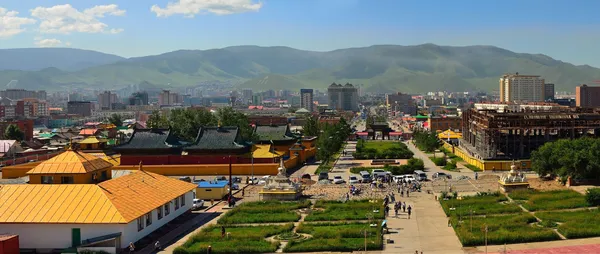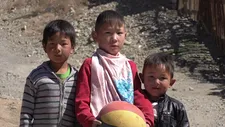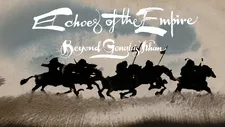 |
| Echoes Of The Empire: Beyond Genghis Khan |
It has long been regarded as one of the world’s great wildernesses, a mysterious nation whose people, once regarded with fear and awe across a continent, rarely find a place in modern discourse. Robert H Lieberman’s documentary sets out to change that, taking viewers on a journey through Mongolia past and present. Echoes Of The Empire: Beyond Genghis Khan is one of a series of such films he was made, following They Call It Myanmar: Lifting The Curtain and Angkor Awakens: A Portrait Of Cambodia. When we met up to talk, I began by asking him why Mongolia was next in line.
“I'm drawn to places that are off the beaten path,” he says. “Places that are inaccessible. I started They Call It Myanmar with Aung San Suu Kyi, and at the time, you were not allowed to film there, of course. It was like waving a red flag to a bull. And I was working for the US Embassy, I had a Fulbright there teaching film at the American centre, and I was clandestinely filming. So that explains that, I think. And then, with Angkor Awakens....” He pauses for a moment. “I'm a child of the Holocaust. My parents escaped Vienna, barely. I was interested in this genocide, and more importantly, how it affected the children.
“I have lots of friends who grew up in Kew Gardens, and I did a film called Last Stop Kew Gardens, which is about growing up in this city, this village within the big city of New York and Queens, and Kew Gardens. There were many, many refugees there and escapees. And we all spoke German as a first language. And so I'm interested in and I know what the effect is on these children who are now my age. And that is that we have our bags always packed ready to leave. You just never know when they're going to come knocking, whoever they is. And I was curious, you know, in Cambodia, which had this mass genocide, because it was a different one.
“There was no other in this case. They weren’t Jewish people, they weren't Roma, they weren't, you know, whatever. So what effect did it have? And that's what I explore in the film. It covers all the history, like all our films, we weave in the modern and the past. And I was just looking, you know, at what goes on in people's heads. That's what I'm really interested in. And I think, yeah, Mongolia, not easily reachable. In fact, travel there is just brutal - you’re in a four wheel drive, there are only a few real roads – but it's it's a very interesting and very unique place. And most people are not going to go to Mongolia.
“So I thought, this is a neat place to take you into this huge country, which has only, you know, three million people, which is one of the draws of the country, and it's post Soviet so it's very strange in the sense that it's a place where women are more educated than men and where women have a hard time finding mates of comparable educational background. Everything about it is unusual. And I'm drawn to unusual places. Burma, Vietnam, if you want to call it that, Cambodia, and now I'd like to go to Iraq.”
Much of the film is focused around Ulan Bator. I ask if he travelled a lot within the country to find his subjects.
 |
| Horses on the steppe |
“There was a lot of travel,” he says, letting the effort of it show in his voice. “I went all over the country. I was in Bayan-Ölgii Province, which is in the Northwest right against the Kazakh border. And yeah, I was sleeping in a tent and there was snow. This was in April; it was cold. And sleeping and living with families who were very generous on the steppe. They took me in. I was up also in Uvs, which is right on the border with Siberia, and I stayed with a family in their house. Everybody's sleeping on the floor or in a yurt, which they call gurs there. There's no privacy to speak up and you better be able to go out in the fields to poop, you know?” He laughs recalling how one trip through the area felt like six hours just being beaten to death in a four wheel drive.
“I came back to the town, and the next next morning, I couldn't get out of bed. I thought, ‘Oh my God, have I got a flu or something? If I'm really sick, what am I going to do? How am I going to get back up? Well, it turns out that I was just exhausted. And by by noontime I was good as new, but you get just so exhausted, it's really a tough place to travel. It's not a five star hotel.”
It was interesting to see a little bit of the wooded country to the north. Mention Mongolia and most people think only of the steppe, but it’s quite a varied country.
“Yes, it is varied. Much of it is high desert. It's like Denver and that area, you know, out west. It's high, it's dry. And to the Northeast there is forest, and on the Siberian border, in the Northeast, they even have reindeer herders, they raise reindeer, which is very similar to Scandinavia, where I lived for a long time. So it's like Lapland, essentially. It’s a very varied climate. The winters get down to minus 50 below. I live in Ithaca, New York, where it gets down to, I'm talking about, well, actually Fahrenheit and centigrade meet, you know, I think at minus 40. It doesn't matter which one you're talking about. It's a very harsh climate.
“I'm a novelist, and essentially what I'm trying to do is give you a novelist’s eye view of the place. And one of our stars is Jack Weatherford, who is a New York Times bestseller in the true sense. He wrote Genghis Khan And The Making Of The Modern World. And I've tried to give a sense of the history of the country. I'd like to take full credit for the film but the truth is, I did the shooting on the ground but there were people working with me getting drone shots. And we have a wonderful studio, PhotoSynthesis Productions, where all the post production was done, the animation, the sound editing, and I could never have done it without them. I go au flaneur, that is as somebody who wanders around and looks at windows, and I sort of gather up people that are interesting, and I shoot the interviews. And the hard work is done back at the studio.”
I wondered about that side of it, and how he found people. Was it a case of just finding people through others?
“I teach physics at Cornell. I've been on the faculty for many years,” he says. “And we have Cornellians in Ulan Bator and they helped. I usually have all the research done before I land, so I'm off and running usually right from the beginning and one person does lead to 100 people They generally are eager to tell their stories. And I shoot in very unusual way.
“When I did the film in, in Myanmar, Burma, and it was illegal to film, I knew I had to do it on my own. I'm a photographer and I think I know how to frame stuff. And so I shot on my own and what I do – or did in that first film – was to shoot with a small camera and use available lighting, if I can get a person in a room with two windows on a corner and get them relaxed. And you know, I make coffee and sandwiches if need be. And people will open up in a way they will not in front of a crew. So I get these rather intimate views of what these people were thinking, and so that's my modus operandi.”
I wondered about his decision to shoot the film in English, rather than for instance, going through translators all the time or subtitling. Did he feel that it was important for accessibility?
 |
| Children playing outside Ulan Bator |
“It was vital for accessibility,” he says. “I don't know about the Brits, but Americans don't like to read subtitles. And there's resistance to subtitles. And also it would have drawn out the process. It already took a couple of years to put this film together, it would have been much, much slower and longer. We do have Mongolians speaking in Mongolian with subtitles, but yeah, we made this conscious decision that we will have some native speakers, but also we will try for English. In Burma that is not a great problem. It was a former English colony. In Cambodia a lot of people speak English and French. And then in Mongolia there is a significant number of English speakers but not on the steppe. The people living on the steppe, you know, they're herders.”
We discuss the Soviet era and the efforts made, under Stalin, to suppress the country’s proud history and traditional culture.
“People were not allowed to mention Genghis Khan,” he reflects. “And after 1991 – the wall fell in 1990, but 1991 they got their independence – suddenly, the name Genghis Khan came back to life. He’s sort of used as a role model, as you'll see in the film. The men think of themselves as warriors. He could be brutal. He would attack a city and if you didn't surrender, you know, you’d get it. If you did surrender then essentially he gave you a pass and you became part of the Empire. Usually the nobility was killed. And, you know, there was religious freedom. He introduced the rule of law, you know, on the good side.
“Let me go full circle back to the Soviet system. So I had a real surprise filming this, because I discovered that all of the Soviets suppressed the name of Genghis Khan. They killed 20,000 Llamas, but on the other hand, they left a legacy. Aside from theatre buildings and things like this – and it does feel very close to Soviet because I've lived in Czechoslovakia, under the Communists – I discovered that they have world class opera, and ballet. I mean, this is as good as New York, as good as London. The Mongolians, as you discover in the film, are very musical. There's a kind of natural musical talent. And they have the long song but they also sing opera. La Boheme. Madame Butterfly.
“I had a lot of fun. I would go to rehearsals constantly because I just love music. And while we're apropos music, we have this band, the Hu, in the film, and they're just tremendous. I mean, their music is very catchy. They're doing constant tours around the globe. I'm sure they've been in England, all over the US, etc, and Australia. So that was my big discovery.”
Does he think that it's because of the sheer size of the country and the fact that so many people are nomads, that it managed to maintain its distinct identity through the Soviet era?
“Collectivization did take place, and it was pretty disastrous for them,” he observes.”Mongolia probably held on to its identity among the herders. The urban environment is very different. And the question is, yeah, how much of the culture really does remain? And that's one of the concerns. In fact, the film ends with a Mongolian talking about this, about retaining their culture. So I don't know. It's getting tougher and tougher to live on the steppe. There have been major droughts in the winter, they have dzuds, which are extreme weather events, they can lose 1,000 head of livestock. So that is a hard life. And many of the herders will move into the city. And as you'll discover in the film, they have the right to move their gurs around the city, but it's really a bad situation. They don't have water. They don't have electricity. And it verges on urban slums.
“Of course, pollution is a major problem. They have large supplies of coal, but it’s brown coal, which is highly polluting. I think that Ulan Bator is the worst city on the planet in the winter. In the summer, it's glorious: blue sky, you know, dry and warm and wonderful. But the winters are are horrible because of the cold. And they need to make that transition away from coal. The country is, by the way, resource rich. It has copper, it has rare earth minerals and coal. It does, I think, suffer from the resource curse.”
 |
| Echoes Of The Empire: Beyond Genghis Khan poster |
I mention that in Scotland, where I am, a lot of our electricity is produced from wind power. It struck me that wind could be a huge resource on the steppe as well.
“Yes, wind and solar. It's obvious. Yes, it's expensive to do, but they have started. You could put vast, vast solar farms on the steppe where they have sun. It's the land of blue sky, as they call it. So, yeah, it's natural.
“Now I’m going to talk like a scientist,” he says in an apologetic tone. “The issue is, of course, when the sun is down or the wind stops. But, you know, here in the United States, we're really looking at technologies to store electricity. Batteries are clumsy solution, so we're now looking at things like having two hydroelectric dams on two lakes or reservoirs.” He uses his hands to illustrate how one will be positioned higher up that the other. “The water comes down through turbines, and drives them to create electricity. And you use the electricity during the high point of solar to pump water back up to the upper one. You're essentially converting kinetic energy into potential energy. So this is one of the problems facing the world as we go green, as we eliminate Russian oil and gas to Europe. For me, that's a very interesting area, renewables. But hey, global warming is just a fiction, right?” He gives a tired laugh.
We’re coming to the end of our time, so I ask him what message he would like to give to people about the film.
“I want people to let me take them on this journey,” he says. “It's not a travelogue. But I want you to come with me and see through my eyes, through the eyes of a novelist. What this place is like, what this vast country is like, and I want you to enjoy it. So mostly, it's going to be entertaining. In fact, all my novels are easy to read. They take you on a ride, and I'm hoping that happens with this film.”
Echoes Of The Empire: Beyond Genghis Khan is opening in US cinemas on 3 June and will be available on digital platforms on 14 June.





















